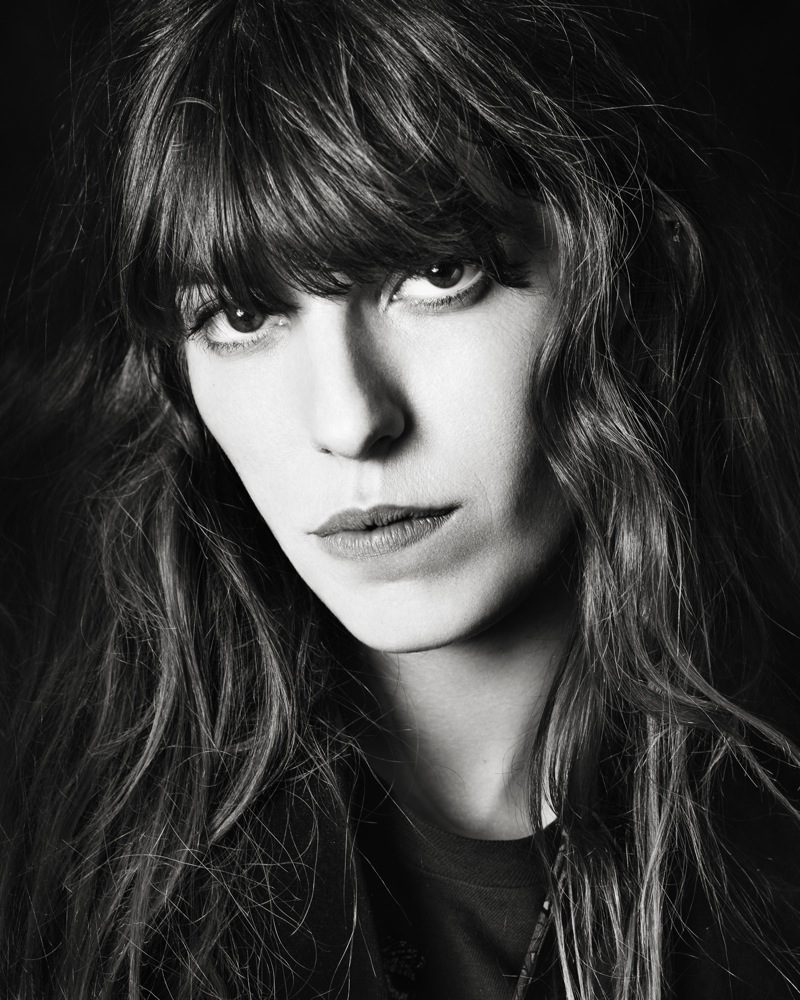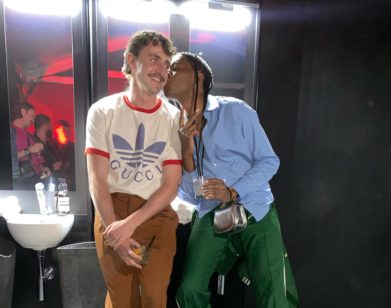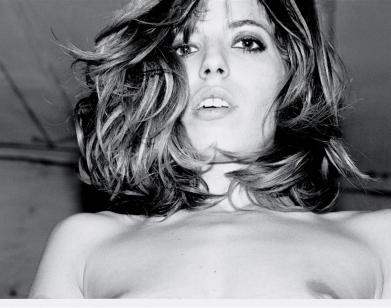Lou Doillon’s Canadian Love Affair
LOU DOILLON IN NEW YORK, FEBRUARY 2016. PHOTOS: DAEMIAN SMITH + CHRISTINE SAUREZ. HAIR: YUKIKO FOR ORIBE HAIR CARE AT WM ARTIST MANAGEMENT.
Lou Doillon‘s latest release Lay Low transports listeners, allowing them to feel as though they are in the room with her. Muted piano, subtle sounds of doors closing and opening, and rusty guitar join her deeply personal and raw vocals. “My brain’s a mess / My heart’s a mess / And I’ve got nothing, nothing left,” she croons on “Nothing Left” before a steady bass and psychedelic guitar line take over. She continues, “Now I can barely see where I’m standing / Could you please get out of my way?” on “Above My Head.” Released in France in October and in the States just two weeks ago, Lay Low is Doillon’s sophomore LP, although it’s the first she recorded with someone else. The musician and former actress and model traveled to Canada, where she worked with Timber Timbre’s Taylor Kirk at Hotel2Tango.
“It was fun to confront my writing with Taylor, who I think is used to collaborating, even in the lyrics,” she says. “I was quite stubborn. I think he read it on my face, where it was like, ‘Even if it’s crooked, don’t touch it. That’s the way it is.'”
The crookedness Doillon mentions is the exact quality that allows her music to resonate. The lyrics are simple—she says what she wants to say without hidden meaning—and the music is beautifully composed, though a slight fuzz surrounding each song helps transcends personal experiences into dreamlike states.
Last week, during a brief trip to New York before her Canadian tour, we met Doillon (who you might recognize as the daughter of Jane Birkin and Jacques Doillon, and the sister of Charlotte Gainsbourg) at the Gibson Guitar Showroom in Manhattan. We spoke about everything from working with Kirk to 16th- and 17th-century Japanese songwriting.
EMILY MCDERMOTT: So I know you recorded this album in Canada with Taylor Kirk. Why did you want to go to Canada?
LOU DOILLON: It was to work with Taylor. I guess if he’d been on the moon, I would’ve recorded the album on the moon. It was really to get to him, but the more it went, the more I realized I had a real bond with Canada, especially Quebec and Montreal. It’s a bilingual city, which I love because I can go from French to English and everyone does the same, and it’s a city that’s made every mark for itself. It’s always had to pay for the lack of support from the French, the English, and the Americans, which means they’ve got the real freedom to be what they want to be.
[The music] seems to be a mixture of Europe and America in the best way. I hate putting names to anyone’s music, and my own also, but they have a relationship music that I love, what’s folky or a bit like independent music. It shares what I love with Californian music: You can feel space musically. You can feel that there’s the desert in California, and you feel that there’s a sort of snow desert in Canada. I hear it in all the Canadians that I love, whether it’s the young generation or the older generation. At one point I was like, “I love Leonard Cohen, I love Lhasa, I love Neil Young, I love Timbre Timbre,” and suddenly it dawned on me they were all Canadian—all from Quebec, actually. I hadn’t thought about it before, but it’s true that in the 20 albums I listen to all the time, at least half are Canadian.
MCDERMOTT: Have you returned to those same 20 albums your whole life?
DOILLON: I guess so. There’s a form of not only generosity, but also a kind of human love that I find with Leonard Cohen or Neil Young. It seems to be out of time; you don’t find that with people who are rushing to be cool or hip. There is a great kindness, also. Seeing them perform, it’s the same thing; you really feel that every album, whether they tried different stuff, there’s a continuity that I love. You feel that they’ve got the European side, in the sense that in Europe or France the public is extremely faithful. If they love someone they will be there for 30 years, be at every concert, and no one really cares if it’s new or not. If they like it, they like it. My friends who live in America and play music, it’s tougher for them because it’s so big and there are so many people.
MCDERMOTT: We can be very ADD when it comes to music.
DOILLON: Yeah, you always have to be there and remind people of you. It’s complicated when you do music, or when you do anything in general. You need time. I don’t know if it’s because of the weather or what, but [Canadians] seem to have a relationship to time that I like very much.
MCDERMOTT: Why did you want to work specifically with Taylor?
DOILLON: Because I could feel that he wasn’t fearful, and even more than that, he was embracing crookedness. There was something old school about his way of recording and having a very definite sound. I find it complicated to listen to albums that are very clinical, when I don’t feel the walls, or the place, or the ground. I love to hear things; I love Glenn Gould, when he’s playing the piano, to hear him breathing or humming or his fingers against the piano. I feel like recording has that importance: You should record a room, things that are happening in the room. On all of Taylor’s albums, I felt that he loved that, that he respected that. I went even further, keeping sounds of opening doors or things happening, because that is very important. Music always has to do with vibrations for me. I love to record everyone’s heartbeats, in way. None of us beats at the same pace and a song is a magical moment where different entities, for a split second, meet up. As soon as it’s behind computers and machines, which the majority of the planet loves, I find it cold. I need to hear breathing. I like the idea of the mic being a captation of everything that’s happening around.
I was reading a great book by David Byrne How Music Works. With Brian Eno, they went so far with tools and computers, and after 30 years of having the best gear and the best machines, he says “We realized we were always looking for a studio that sounded good.” It’s nearly witchcraft; nobody knows why a studio sounds good or not. Some studios have been built to sound good and they sound like shit. Other places can be crummy and have a great sound. That place, Hotel2Tango, has a great sound. It lives. The first album was in a very sterile modern studio and I didn’t want that for the second.
MCDERMOTT: What are some of the greatest things you learned from working with him?
DOILLON: We have great arguments and I think one learns a lot from arguments. One of our biggest arguments was that I’m very obsessed with ’60s- or ’70s-type music, where you went into the studio, had five days to do it, and that was it. I believe in urgency for music. He likes to layer more and I’m the kind of person who strips it down. I love to have an album that I can play live and it sounds the same. That’s what I call my honesty. He was very right, saying the he didn’t know if it was honest or not, and on top of it, the fun of making an album is recording things you’ll never be able to do live. He absolutely taught me that.
He taught me how to be free, also. In France, we have this snobbery where music is so sacred. Everyone says, “Oh, I don’t play an instrument,” and it’s only when they’re perfect that they’ll say, “Oh, vaguely I can play,” and suddenly they’ll play a sonata. We’re so frightened by people’s opinions and it’s full of shit. Music is about generosity; it shouldn’t be that important. So he taught me this great Anglo-Saxon thing, which is just do it, have fun. If it works it’s fine, and if not, we’ll put it in the dustbin, but who cares whether you’re perfect of not? So I thought I had stripped down the whole thing and that I really didn’t have one bit of me left that was trying to impress, but he found it. He found that I still had a bit of pride in the studio, so he taught me how to take that pride away and try new things. He really taught me that it wasn’t important [if I am perfect]. I’m not a brain surgeon, it’s all right, I can fuck up, no one’s life is in danger—only my pride, and pride is such a sad thing.
MCDERMOTT: That must’ve come a greater sense of confidence, too.
DOILLON: Absolutely. I was smart enough to pick the one guy who wouldn’t respect me too much. In France, the first album worked so well that I met people who were treating me very special or very sacred, and I had the good instinct to go find Taylor who—he wasn’t unkind, he just…
MCDERMOTT: Wasn’t afraid to stand up to you.
DOILLON: Right. [He would say,] “Play the guitar,” and you’re like, “I don’t know…I just write my songs,” and he’s like, “Play the fucking guitar.” Suddenly you have to be exactly what you claim you are.
MCDERMOTT: What’s the first song you wrote that is included on the album?
DOILLON: The first was “Weekender Baby.” I wrote the lyrics to that song at least four years ago. It was super sad and suicidal, and was written the month after the first album had been released. When I was writing Lay Low, suddenly in the middle of all my diaries, those lyrics were there, and I couldn’t remember the music. For the last two or three days, I had been playing this tiny four-chord slightly positive melody and I thought, “Now that I’m absolutely over this heartbreak, wouldn’t it be funny to have a happy melody and old lyrics that are super sad? What will happen combined?” I was horrified because it came out in two seconds. I thought, “That can’t be a good song, it came out in two seconds.” So I put it on the side, and it went on for a year and a half, me saying, “Well, I have this little song,” and people going, “Oh, who cares about that song,” but then [hums “Weekender Baby”], like maybe we should put that somewhere.
So “Weekender Baby” is like a stain on my boot. It comes back by itself, it’s got its own life. Some songs are like children, I find. Sometimes they’re like children you don’t understand, and maybe shouldn’t even try to understand. But they just kind of stick around.
MCDERMOTT: I want to go back to David Byrne’s How Music Works. You often quote various books about artists during interviews. Do you find yourself drawn to reading biographies?
DOILLON: I read lots of different stuff. I’m always reading and always forgetting to take a book, so I love secondhand bookshops. You never know what you’re going to fall upon. Yesterday I found an anthology of Japanese songs from the 17th and 18th century. To read the lyrics, it’s absolutely insane how it’s so very like them and so very foreign to us. The repetitions are beautiful, the haiku’s not far. It’s about love and there’s a lot of metaphor, a lot of nature. It’s about going down to a river, seeking a girl by the river, and the girl is always half girl and half animal. Mythology isn’t far, either. I got an Ovid book, The Art of Love. Because I love his Metamorphoses, I thought, “Let’s read what he has to say on love.” What else did I get? Roethke, an American poet I didn’t know, who was Sylvia Plath’s favorite poet, apparently. So I discovered him. I’m not very good on modern fiction.
MCDERMOTT: No, me neither unfortunately…
DOILLON: There’s so many good books, but I’m always like, “I’m sorry, I have five more Faulkners to read, I can’t be bothered.” Most of the time when you try, you fall on the wrong one.
MCDERMOTT: And you read 30 pages and you’re like, “Just kidding. I’m going to go back to the classics.”
DOILLON: Which is very odd. I remember in my acting days it was a nightmare. I’d be reading Proust and putting it down to read the script, and I was like, “Hmm, this dialogue isn’t that good.” [laughs] My father was like, “Can you stop reading Proust?” and these things that would make any person’s dialogue seem really poor after such beauty.
MCDERMOTT: How do you feel about rereading your own lyrics or your own writings?
DOILLON: I’m horrified most of the time. I wish it was more complicated, but at the same time, each time I try to complicate it I hate it because I hate the idea of writing to impress. There’s something I find highly embarrassing about it. As soon as I think I’ve written something smart, the next day I’ve got nausea, thinking, “Don’t even try to be smart, it’s absurd.” The idea of writing with a dictionary of rhymes, or a dictionary in general, I think “No, no, no.” There’s something extremely tribal and simple about music and I like to keep it that way. The majority of my favorite authors, the more they age, the more they go toward simplicity. I think what you need to say, you just need to say. It’s in the younger years that we say things to show off. Then suddenly you think, “No, I want to be understood.” I wish sometimes that I would have more imagination, I guess. I’m always writing about things around me, or things that I know or I see. When I listen to Taylor’s lyrics, for example, he’s always in a dream world. I have crazy dreams but I wouldn’t even know where to start to sing a dream. And it’s the same thing with my drawings. I wish I had the imagination to draw what I’m not seeing, but I’m not that type of person.
LAY LOW IS OUT NOW. FOR MORE ON LOU DOILLON, VISIT HER WEBSITE.




